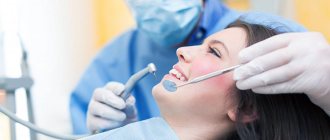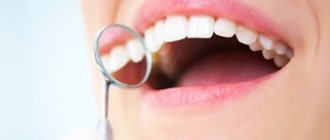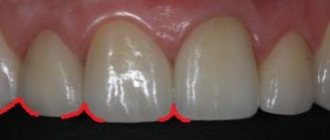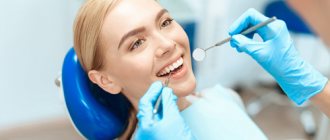- About the procedure
- Is it possible to brush your teeth during pregnancy?
- Stages of ultrasonic teeth cleaning
- Effect of the procedure
- Cost of professional teeth cleaning during pregnancy
Every woman knows that it is necessary to prepare for pregnancy several months before conception. It is very important to prepare your body for such changes. The health of your baby largely depends on your condition. The girl visits various specialists, and, of course, she must meet with the dentist. In order to cure all teeth before pregnancy. The fact is that our bones and teeth consist of calcium, phosphorus and other components, and with the development of a new life, the body requires more of these useful microelements. Since most of the minerals will be spent on the structure of the baby’s skeleton, if they are deficient, the necessary components will be borrowed from the bones of the expectant mother’s teeth. As a result, the condition of the dental units will deteriorate, creating a favorable environment for the development of caries. That is why all dentists are attentive to the treatment of pregnant women. An excellent opportunity to maintain oral health throughout the nine months and in general is professional teeth cleaning during pregnancy. In this article we will talk about whether this procedure can be done for expectant mothers, whether it is safe, and what effect should be expected.
About the procedure
An excellent prevention of dental diseases is regular oral hygiene. The essence of the procedure is to remove plaque and stone accumulated on the enamel. A person cannot do this on his own, using only a toothbrush. The dentist uses a special tool for this – an ultrasonic scaler. It produces waves with a high frequency of vibrations, which affect the surface of the dental units, cleaning it from various deposits. The device has a tip with two holes, from one a special cleaning solution flows, and from the other, pressurized water. The combination of these two components allows you to effectively remove dirt from enamel. The power of the scaler is individually selected for each patient, while the dentinal layer of the tooth is not affected at all. Hygienic brushing of teeth during pregnancy is painless, but in some cases anesthesia may be used. After the procedure, the doctor polishes the dentition using special products.
Professional cleaning allows you to restore the natural color of your teeth by removing tartar and plaque. But if a person wants to make his smile snow-white and lighten it several shades, then you should use the whitening service.
Features of dental treatment
We often hear around us that pregnancy is not a disease. If it proceeds normally and there is no threat of miscarriage, you can live a normal life, including dental treatment if necessary. However, there are a number of features of therapy for this category of citizens.
First of all, the woman’s health status and the course of pregnancy, the presence of fetal development pathologies are taken into account.
So, the following are subject to urgent treatment during a favorable period of gestation:
- caries;
- pulpitis;
- periodontitis;
- stomatitis;
- gingivitis;
- periodontitis;
- glossitis;
- cheilitis.
It is mandatory to provide assistance for injuries and chipped teeth, as well as surgical operations for abscesses or periostitis. Other dental surgeries can wait until after the baby is born. For example, whitening, installation of braces or an implant can easily wait until a woman leaves the maternity hospital.
Various dental materials can be used to fill canals and holes in a tooth. They are selected according to indications or replaced if the girl has an allergic reaction during use.
Lamps used to quickly harden the material do not harm the pregnant woman and her baby.
No less important for a woman is the fact that she will not have to endure pain when the doctor intervenes. There are types of anesthesia that are safe for pregnant women and are used by dentists. The main thing is to clarify this issue before starting treatment. The only contraindication is anesthesia; it negatively affects the condition of the fetus.
Thus, expectant mothers have access to almost all dental treatment procedures within reasonable limits. The main thing is to find out in advance from the supervising doctor from what week of pregnancy you can treat your teeth . And then boldly begin preparing yourself for childbirth.
Is it possible to brush your teeth during pregnancy?
Many people constantly put off visiting the dentist, which can lead to serious problems in the future. If you regularly undergo preventive examinations, you will be able to prevent the development of the disease and take care of the health of your teeth. When planning a pregnancy, a woman has to visit various doctors; one of the required specialists is, of course, a dentist. In order for the expectant mother to have strong teeth, she should be treated for existing diseases and, for preventive purposes, undergo professional oral hygiene. If your doctor prescribes ultrasonic teeth cleaning during pregnancy, then you should not refuse. This procedure is completely safe and perfectly helps reduce the risk of caries. For cleansing, harmless preparations are used, which contain only natural ingredients.
In case of increased tooth sensitivity, the doctor can use local anesthesia; it does not pose a danger to the health of the child and the woman. Brushing your teeth during pregnancy has a lot of positive factors; it not only allows you to clean the enamel of plaque and tartar, but also restores the natural shade of your smile.
Contraindications
Waiting for the birth of your baby is a wonderful time, but this is not a reason to refuse the services of a hygienist. Of course, before the procedure, a woman should consult a doctor to eliminate the risk of complications. Ultrasonic teeth cleaning during pregnancy is not permitted in cases where the patient experiences one of the following conditions:
- 1. violation of nasal breathing;
- 2. HIV;
- 3. asthma, chronic bronchitis;
- 4. ARVI;
- 5. Exacerbation of chronic diseases;
- 6. diabetes.
Many doctors do not recommend professional hygiene in the first trimester,
Early and late dental treatment
During the entire period of gestation, a woman must strictly monitor her health, regularly visiting her doctor at the antenatal clinic. This is important, because at every stage of a child’s development, global processes occur in the womb, in which it is extremely undesirable to interfere.
During dental treatment, medications are often used that can harm the unborn baby.
Pregnancy is divided into three equal trimesters. The early period is calculated up to 12 weeks and this is the most important stage at the stage of gestation. During this period, internal organs and the placenta are formed, which will protect the child throughout the entire period of formation.
It is extremely undesirable to interfere with the functioning of the body at this moment. You should also wait to go to the dentist. It is also not recommended to use medications or take antibiotics that can reduce the natural defenses of a woman’s body and disrupt the development of the baby.
If you have any doubts about your dentist, contact your supervising doctor. He will tell you which week you can treat your teeth .
Late periods are no less dangerous in terms of interference with the body’s activities. The development of the embryo is almost complete, but now the immune system of the expectant mother is greatly weakened, she is preparing for childbirth. The third trimester is calculated from the 25th week until the moment of birth. Doctors note that surgical interventions by dentists are possible up to 32 weeks of gestation. Afterwards, only emergency interventions are possible when there is a risk to the life and health of the woman.
It is important in advance, at the planning stage, to visit a dentist and resolve pressing issues, eliminating all problem areas. In the future, during pregnancy, you will have to visit the dentist in the first trimester and before childbirth to identify problems, if any.
Stages of ultrasonic teeth cleaning
As we can see, professional oral hygiene does not harm the health of a pregnant woman, and even, on the contrary, has a beneficial effect. The procedure can take from 20 to 40 minutes, the duration depends on the degree of contamination of the enamel. Using a scaler, the doctor removes supragingival and subgingival deposits, then cleans plaque from the surface of the teeth.
The solution used, coming from a special apparatus, contains abrasive substances and is made on the basis of soda. It carefully cleans the enamel without damaging the mucous membrane. Finally, the specialist polishes the surface of the teeth and coats them with fluoride varnish.
Is it safe to use anesthesia and x-rays?
The specialists of the Comfort Dentistry clinic use modern treatment technologies. For pregnant women, we use an articaine-based pain reliever. It does not penetrate the circulatory system and the placenta, does not constrict blood vessels, and therefore is harmless to the fetus. The advantage of such anesthesia is that it reduces stress for the woman and calms the nervous system.
As for dental x-rays, it is not as dangerous as x-rays of the lungs, which is prohibited for pregnant women. Still, it is better to refuse radiation. If there is an urgent need, dental x-rays are allowed in the 2nd trimester. At the same time, for safety, the woman’s stomach is covered with a lead apron that does not let the rays through. The most harmless alternative to x-rays is digital radiovisiography.
Effect of the procedure
It may seem to some that plaque is not dangerous, but its accumulation provokes the development of pathogens that destroy the enamel. A person also develops a characteristic bad breath. Therefore, the benefits of hygienic teeth cleaning should not be underestimated. During pregnancy, this service reduces the risk of caries and prevents the occurrence of oral pathologies. In addition, after ultrasound, the enamel becomes lighter and the dark pigment disappears.
Contraindications
The main prohibition for dental intervention is the threat of premature miscarriage or childbirth before the due date. We are not talking about dental treatment if the woman is in hospital for conservation. If you feel perfectly well, it is better to go for a consultation with a doctor.
There are a number of manipulations that you should forget about before the baby is born:
- Professional teeth whitening. It is considered a direct contraindication during pregnancy, since during this period the tooth enamel is too weakened and the result will be unpredictable.
- Dental prosthetics at the stage of surgical intervention. We are talking about permanent prostheses, which take a long time to adjust and require periodic visits to the doctor for the purpose of certain manipulations. You can give preference to removable dentures, which require less intervention from the dentist, or wait until the child is born.
- Implantation. The woman’s body’s immunity is greatly weakened, so the risks that the implant will not take root are too great.
Sometimes it is permissible to install a prosthesis on an already established base. But these manipulations are carried out only with the permission of the observing gynecologist and dentist.
Having found out at what stage of pregnancy teeth are treated and having confirmed with the doctor that there are no contraindications, you can safely go for the services of a dentist. It is better to get yourself in order before the baby arrives and eliminate sources of infection. If there are contraindications, we advise you to consult with the supervising doctor in order to assess the risks and the possibility of waiting for childbirth before performing manipulations. You should not make rash decisions on your own; help should be qualified.
Consequences of improper treatment
A pregnant patient is a big responsibility for a dentist. He will need all the knowledge gained during work and study, and high qualifications of a professional. This does not mean at all that a woman’s body can react negatively to dental treatment, but clinical cases are different, and it is necessary to anticipate all complications.
The hormonal background of a woman during pregnancy is too unstable. He may react unpredictably to the doctor's interventions.
There are a number of possible consequences that arise as a result of poor quality treatment:
- Sharp jumps in blood pressure.
- Arrhythmia.
- Muscle spasms and severe cramps.
- Drowsiness and increased fatigue of the body.
The most unpleasant consequences, fetal pathologies and birth injuries can be caused by improper use of medications, as well as non-compliance with hygiene rules. An important factor is how long teeth can be treated . A doctor's mistake can have negative consequences.
That is why it is important to monitor your oral cavity even at the stage of pregnancy planning.
Provided that the conception occurred unplanned, it is recommended to undergo a medical examination as soon as possible and check with the dentist when and how to undergo treatment and eliminate dental problems, if any. Be sure to discuss plans for therapy with the observing gynecologist. It is important that the treatment procedure does not cause negative consequences for the woman and the unborn child.











